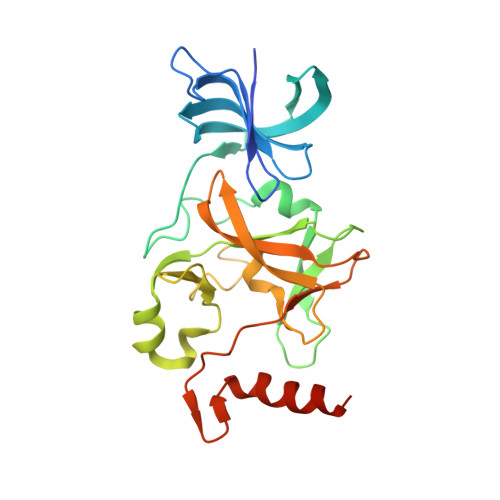(R)-PFI-2 is a potent and selective inhibitor of SETD7 methyltransferase activity in cells.
Barsyte-Lovejoy, D., Li, F., Oudhoff, M.J., Tatlock, J.H., Dong, A., Zeng, H., Wu, H., Freeman, S.A., Schapira, M., Senisterra, G.A., Kuznetsova, E., Marcellus, R., Allali-Hassani, A., Kennedy, S., Lambert, J.P., Couzens, A.L., Aman, A., Gingras, A.C., Al-Awar, R., Fish, P.V., Gerstenberger, B.S., Roberts, L., Benn, C.L., Grimley, R.L., Braam, M.J., Rossi, F.M., Sudol, M., Brown, P.J., Bunnage, M.E., Owen, D.R., Zaph, C., Vedadi, M., Arrowsmith, C.H.(2014) Proc Natl Acad Sci U S A 111: 12853-12858
- PubMed: 25136132
- DOI: https://doi.org/10.1073/pnas.1407358111
- Primary Citation of Related Structures:
4JLG - PubMed Abstract:
SET domain containing (lysine methyltransferase) 7 (SETD7) is implicated in multiple signaling and disease related pathways with a broad diversity of reported substrates. Here, we report the discovery of (R)-PFI-2-a first-in-class, potent (Ki (app) = 0.33 nM), selective, and cell-active inhibitor of the methyltransferase activity of human SETD7-and its 500-fold less active enantiomer, (S)-PFI-2. (R)-PFI-2 exhibits an unusual cofactor-dependent and substrate-competitive inhibitory mechanism by occupying the substrate peptide binding groove of SETD7, including the catalytic lysine-binding channel, and by making direct contact with the donor methyl group of the cofactor, S-adenosylmethionine. Chemoproteomics experiments using a biotinylated derivative of (R)-PFI-2 demonstrated dose-dependent competition for binding to endogenous SETD7 in MCF7 cells pretreated with (R)-PFI-2. In murine embryonic fibroblasts, (R)-PFI-2 treatment phenocopied the effects of Setd7 deficiency on Hippo pathway signaling, via modulation of the transcriptional coactivator Yes-associated protein (YAP) and regulation of YAP target genes. In confluent MCF7 cells, (R)-PFI-2 rapidly altered YAP localization, suggesting continuous and dynamic regulation of YAP by the methyltransferase activity of SETD7. These data establish (R)-PFI-2 and related compounds as a valuable tool-kit for the study of the diverse roles of SETD7 in cells and further validate protein methyltransferases as a druggable target class.
Organizational Affiliation:
Structural Genomics Consortium, University of Toronto, Toronto, ON, Canada M5G 1L7; carrow@uhnres.utoronto.ca m.vedadi@utoronto.ca d.barsyte@utoronto.ca.

















